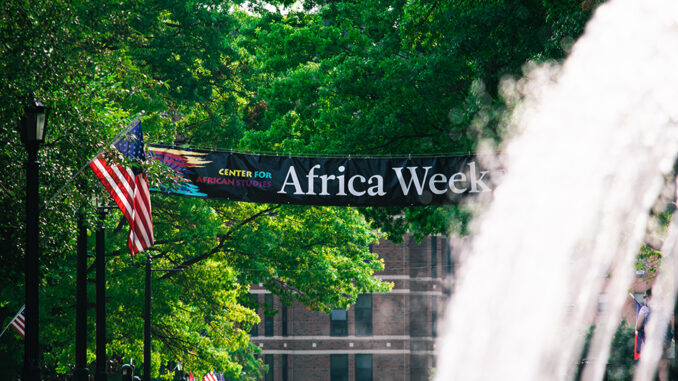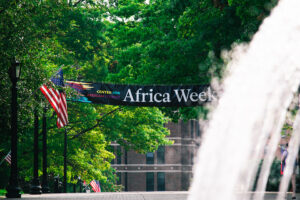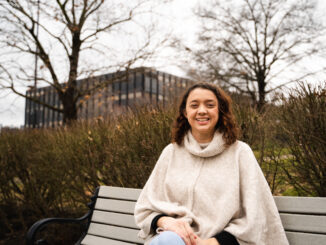

Katia Faroun | Features Editor
09/17/2020
When discussing colonization, most people think of Christopher Columbus and the conquest of land and people. But there’s another consequence rarely mentioned, but just as significant: the colonization of knowledge.
Oyeronke Oyewumi took the Zoom podium on Tuesday to explore the topics of knowledge, gender and language with the Duquesne community. One of three events of this year’s virtual Africa Week, Oyewumi’s webinar, “Decolonizing Knowledge: Re-Centering Africa and African Epistemologies in the Quest for Global Transformation,” addressed how European colonizers suppressed African knowledge and what that looks like today.
Born in Nigeria, Oyewumi is an author and scholar, and she teaches sociology at Stony Brook University. She has written multiple books on the intersection of gender and epistemology in West African culture.
Before diving into the main topics of the webinar, Oyewumi gave attendees a brief introduction to how the current interpretation of knowledge has been defined by the idea that those of European descent are inherently superior. The rise of the West narrative overshadowed and degraded the African narrative, compiling the “single story of Africa” we have today, according to Oyewumi.
“The way in which knowledge has been constituted in the world we live in today is quite eurocentric — disregarding Africa, disregarding other people,” Oyewumi said.
The first half of her lecture centered on the relationship between gender and power. Oyewumi noted that because many Western languages have gender pronouns, gender has influenced the power dynamics of Western countries, creating room for inequality and a gender hierarchy. In the case of the West African language Yoruba, however, pronouns are not gender specific, and the only hierarchy that exists in that culture is that of seniority.
Oyewumi explained that this characteristic of Western languages implies that one gender deserves more power over the other. The historical assumptions that women are excluded from the public sphere, minors in society and deserving of only certain roles created the traditional European gender constructs.
This idea, consequently, delegated the role of producing knowledge to the male gender, and infiltrated Ifá, the Yoruba system of knowledge based in divination. Once English — and its gendered pronouns — began infiltrating Ifá, knowledge began to be associated with gender, and sparked what Oyewumi called an “epistemicide.” In this way, according to Oyewumi, a non-gender category was changed into a male-exclusive category.
“I call it the deadly ‘he,’” Oyewumi said. “Every human being, every personnel, every character in the Ifá world is immediately transformed into male.”
By eliminating the gender hierarchy imposed by European colonization and the English language, we can further prevent the subjugation of other systems of knowledge, according to Oyewumi.
“Ultimately, the goal of decolonizing is to reclaim our habits of sovereignty,” Oyewumi said. “Thus, the recovery of endogenous intellectual traditions is necessary as Africans seek to reclaim their sovereignty.”
The webinar ended with a time for questions, which centered around a discussion on the topic of pandemic epistemology — what we are learning from ourselves and other countries during this pandemic. In Africa’s case, despite the fact that cases are low and there haven’t been as many deaths as expected, the continent isn’t being credited for its successful management of the outbreak.
“No one wants to give credit to the management of COVID-19 by some African countries,” Oyewumi said. “Some have done very well — much better than the U.S., much better than Spain — in managing it.”
Oyewumi’s book, “The Invention of Women: Making an African Sense of Western Gender Discourses,” has been used by faculty as part of course curriculum for a number of years, and the Center for African Studies was eager to have Oyewumi speak on her experiences as part of this week’s events.
Dr. Gerald Boodoo, director of the Center for African Studies, thought the event “went fantastic” and appreciated the relevance and importance of the topics discussed. Like Oyewumi, he believes in Africa’s potential to reclaim and decolonize its system of knowledge.
“Africans have to have the agency to take on and solve their own problems,” Boodoo said. “Everybody has advice on what should happen in Africa, but no one’s asking Africans.”
By bringing awareness to this shift imposed by the English language, Oyewumi actively exposed how the African system of knowledge was degraded, but that there is hope for it to reclaim dominance over its own knowledge.
“Decolonization of knowledge must be a transitional phase in our quest for sovereignty and freedom,” Oyewumi said.
A recording of the Zoom webinar can be found here.




